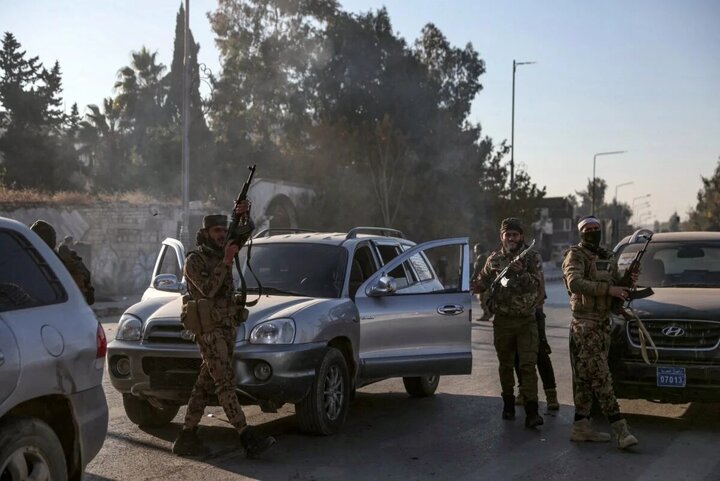By outlining a four-year roadmap to take a step towards the political process and official elections, the participation of various Syrian groups and movements will be impossible, and the regime of Abu Mohammad al-Jolani can take over all the organs of power under this pretext.
The New Year began in a difficult situation for the Syrian nation, so there is no sign of the beginning of the year in Damascus, Aleppo, and other cities.
There is relative stability in Syria in the winter, but it is not yet clear what the future of the country will be and how its political and executive structure will be stabilized.
However, the ongoing signs and actions indicate that all sensitive posts belong to people who previously held arms as extremist rebels in Idlib and now identify themselves as Syrian political officials in suits and ties.
Most Western media in recent days have used the term "Syrian de facto leader" to describe the designation of al-Jolani, the head of the HTS terrorist regime.
The political and legal term of the defacto leader is a leader who has taken power not in a political and electoral process, but in an emergency and is informal and is a person who is not elected by citizens but is a leader in practice. Both Reuters, Agence France-Presse, and several other media outlets have used the same term to describe al-Jolani's post. Such an approach suggests that Westerners are also reluctant to consider the statements and positions of the current Syrian government chief as credible and official.
The Associated Press has noted that based on the experiences and events that have been observed in Tunisia, Egypt, Libya, Yemen, and Sudan in recent years, the lack of transfer of power to civilians is a sensitive and decisive issue and can lead to a chain of subsequent events, especially since it is not yet clear whether al-Jolani will seek a cleanup or compromise on the remnants of the previous government.
According to the New York Times, the Trump administration's policy on Syria and Washington-Damascus relations is not yet clear, but al-Jolani has repeatedly expressed hope that US President-elect Donald Trump will lift sanctions against Syria.
Senior US diplomats recently visited Damascus, and the $ 10-million reward for al-Jolani's arrest has been canceled. US State Department experts described al-Jolani's statements as pragmatic but noted uncertainty about his future positions. Reuters reported that al-Jolani expressed no urgency for elections, suggesting it could take up to four years to hold them and three years to draft a new Syrian constitution. However, these timelines are not guaranteed, and it is unlikely that the process will exceed four years.
Al-Jolani, the leader of Tahrir al-Sham, which ousted Syrian President Bashar al-Assad, stated in a Saudi media interview that organizing elections and drafting a new constitution could take up to four years. Evidence indicates that many of his political decisions are influenced by Ankara, with at least three ministers in the interim Damascus government having graduated from Turkish universities. The Ankara-based newspaper "Karar" reports that the ministers of Justice, local affairs, and several local executives in Damascus and Aleppo are Turkish university alumni. Additionally, Turkish intelligence chief Ibrahim Kalin has reportedly assembled a team to advise on establishing a new Syrian intelligence agency under al-Jolani's regime.
Turkish Foreign Minister Hakan Fidan has publicly acknowledged his past contacts with all Syrian opposition groups, including al-Jolani, during his 13 years at MIT, and is now sharing his expertise with al-Jolani's regime. These statements suggest that Erdogan's team seeks to prolong the Syrian political process and strengthen al-Jolani's position.
Under these circumstances, it is likely that all military, law enforcement, and critical ministries, along with vital documents and financial resources, will remain under al-Jolani's control. Consequently, the political process and elections aimed at restructuring Syria may marginalize many political, social, ethnic, and religious groups.
Since Bashar al-Assad's fall, the Israeli air force has persistently attacked military and defense facilities, even targeting bases near Damascus. Al-Jolani's regime has remained silent amid these aggressions, suggesting a coordinated response, as al-Jolani has not publicly condemned the attacks. Notably, Benjamin Netanyahu has claimed that Syria requires multi-billion dollar aid for reconstruction.
Western analysts are examining the historical cooperation between al-Jolani and Israel, recalling that al-Nusra Front, now Tahrir al-Sham, collaborated with Israel during the 2014 battles against Hezbollah and the Syrian army. Reports indicate that al-Nusra Front members received medical treatment in Israeli military hospitals. Consequently, the Israeli army has expanded its occupation in southern Syria, stretching from Mount Hermon to the outskirts of Damascus, covering over 500 square kilometers.

























Your Comment